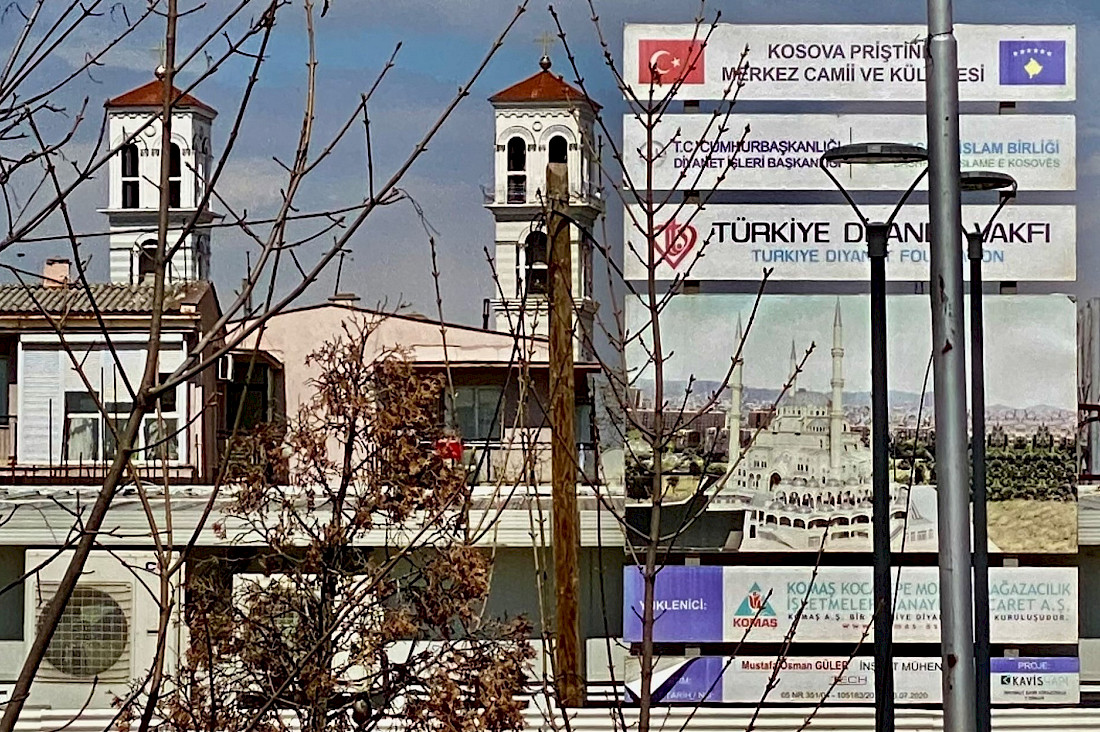Mosque Politics: Re-Mapping Turkish Power and Religious Policies in the Western Balkans
Prof. Dr. Kerem Öktem, Ca‘ Foscari University of Venice and Orient- Institut Istanbul Prof. Dr. Nathalie Clayer, EHESS and CETOBAC Prof. Dr. Rebecca Bryant, University of Utrecht
Speakers
- Prof. Dr. Kerem Öktem, Ca‘ Foscari University of Venice and Orient- Institut Istanbul: Introduction to Turkey’s ‘Mosque Politics’
- Prof. Dr. Nathalie Clayer, EHESS and CETOBAC: Studying the Construction of Mosques (stakes, actors, spaces and materialities): The example of (interwar) Albania
- Prof. Dr. Rebecca Bryant, University of Utrecht: From Paternal to Fraternal Domination: Global “Big Brothers” and Infrastructural Imperialism
Topic
Across space and time, the construction of religious infrastructures and iconic architectures has been closely associated with projects of political and economic domination. In the Western Balkans, mosques, churches, and the religious and secular infrastructures they engendered have frequently served the interests of imperial powers. Yet, such constructions have rarely been mere instruments of imperial domination. Nation-states, as well as other actors, have strategically employed church- and mosque-building to assert visibility and political sovereignty, promote national unity, and shape both internal politics and foreign relations.
In this online event, Prof. Dr. Kerem Öktem will propose a historical and conceptual framework of how to think about Turkey’s “Mosque-Politics” and then introduce the two speakers. Prof. Dr. Nathalie Clayer will examine the post-Ottoman Balkans and discuss how mosque construction in inter war Albania was mobilized to consolidate both internal politics and foreign relations. Prof. Dr. Rebecca Bryant will explore the more recent (or return) actor Turkey who has been engaging in imperial policies that place large-scale religious infrastructures and ‘fraternal’ domination at their core. Turkish neo-Ottoman mosque-building renders a particular form and historicity of Islam hypervisible in societies where such visibility had long been muted or avoided while they also create new zones of contact and contestation. Together, the two lectures will shed light on their complex symbolism and the political stakes they carry.
Prof. Dr. Nathalie Clayer is Research Professor at EHESS, Paris and a Senior Research Fellow at CNRS-CETOBAC, Paris. Her main early research theme was the history of Muslim mystical brotherhoods in the Balkans and, more generally, in the Ottoman Empire. While deepening her research on Albanian Islam, she became interested in questions of identity and nationalism. Current events have also pushed her towards studies concerning Islam at the heart of post-communist transformations. Furthermore, she has turned to the study of the transition from empire to nation-state. Her research has concerned, on the one hand, the political and social transformations in the final years of the Ottoman era and, on the other hand, the question of religion, power and state formation in inter-war Albania. This led her to work also, on a comparative basis, on the management of religious plurality in Turkey, as well as on the broader issue of Kemalism. In recent years, her work has focused on five main issues: religious pluralism; mobilisation and the formation of the state; networks, transfers and mobilities; space; and biographical approaches.
Prof. Dr. Rebecca Bryant is Professor of Cultural Anthropology at Utrecht University. She studied Cultural Anthropology at the University of Chicago and has since held teaching and research positions at the London School of Economics, George Mason University, and the American University in Cairo. Bryant is an anthropologist of politics and law whose work has focused on ethnic conflict and displacement, border practices, post-conflict reconciliation, and contested sovereignty on both sides of the Cyprus Green Line, as well as in Greece and Turkey. Her fields of expertise include forced migration in the eastern Mediterranean; ethnic conflict and displacement; borders and sovereignty; gender and the state; political culture in Southeast Europe; post-conflict reconciliation; unrecognized states; conflict and temporality.
Prof. Dr. Kerem Öktem is Professor of Politics and International Relations at Ca’ Foscari University of Venice and Senior Research Associate at the Orient-Institute Istanbul, where he conducts a research project on Turkey’s imperial policies in the Balkans.
This event will be live streamed from Istanbul. The local time will be 14:30, and GMT+2 will be 13:30.
Am 13.06.2025, 13:30 h
Venue: online via Zoom
In cooperation with


